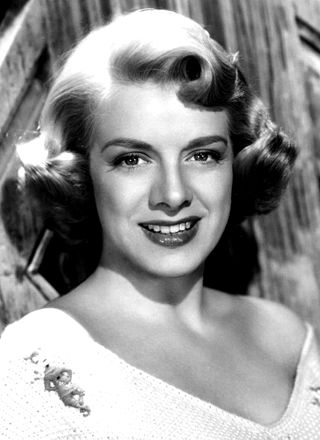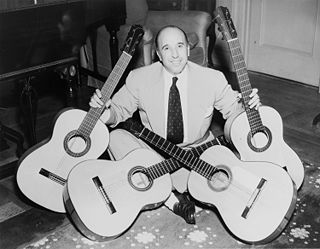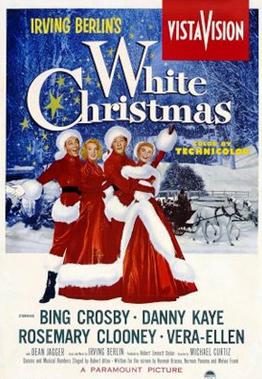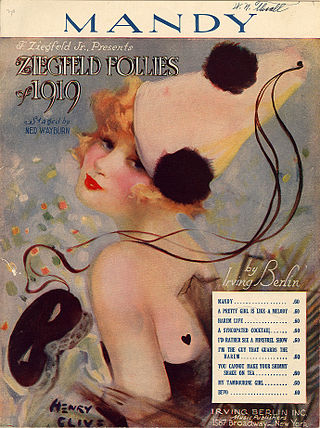
Harry Lillis "Bing" Crosby Jr. was an American singer, actor, television producer, television and radio personality and businessman. The first multimedia star, he was one of the most popular and influential musical artists of the 20th century worldwide. Crosby was a leader in record sales, network radio ratings, and motion picture grosses from 1926 to 1977. He was one of the first global cultural icons. Crosby made over 70 feature films and recorded more than 1,600 songs.

Irving Berlin was an American composer and lyricist. His music forms a large part of the Great American Songbook. Berlin received numerous honors including an Academy Award, a Grammy Award, and a Tony Award. He also received the Presidential Medal of Freedom from President Gerald R. Ford in 1977. Broadcast journalist Walter Cronkite stated he "helped write the story of this country, capturing the best of who we are and the dreams that shape our lives".

Rosemary Clooney was an American singer and actress. She came to prominence in the early 1950s with the song "Come On-a My House", which was followed by other pop numbers such as "Botch-a-Me", "Mambo Italiano", "Tenderly", "Half as Much", "Hey There", "This Ole House", and "Sway". She also had success as a jazz vocalist. Clooney's career languished in the 1960s, partly because of problems related to depression and drug addiction, but revived in 1977, when her White Christmas co-star Bing Crosby asked her to appear with him at a show marking his 50th anniversary in show business. She continued recording until her death in 2002.

This is a list of notable events in music that took place in the year 1954.

Holiday Inn is a 1942 American musical film starring Bing Crosby and Fred Astaire, with Marjorie Reynolds, Virginia Dale, and Walter Abel. It was directed by Mark Sandrich with music by Irving Berlin. The composer wrote twelve songs specifically for the film, the best known being "White Christmas". The film features a complete reuse of the song "Easter Parade", written by Berlin for the 1933 Broadway revue As Thousands Cheer and used as a highlight of the 1948 film Easter Parade, starring Astaire and Judy Garland. The film's choreography was by Danny Dare.

John Francis Burke was an American lyricist, successful and prolific between the 1920s and 1950s. His work is considered part of the Great American Songbook.
Sisters is a popular song written by Irving Berlin in 1954, best known from the 1954 film White Christmas.

White Christmas is a 1954 American musical film directed by Michael Curtiz and starring Bing Crosby, Danny Kaye, Rosemary Clooney, and Vera-Ellen. Filmed in Technicolor, it features the songs of Irving Berlin, including a new version of the title song, "White Christmas", introduced by Crosby in the 1942 film Holiday Inn.
The 27th Academy Awards were held on March 30, 1955 to honor the best films of 1954, hosted by Bob Hope at the RKO Pantages Theatre in Hollywood with Thelma Ritter hosting from the NBC Century Theatre in New York City.
"I've Grown Accustomed to Her Face" is a song from the 1956 musical My Fair Lady, with music by Frederick Loewe and lyrics by Alan Jay Lerner. It was originally performed by Rex Harrison as Professor Henry Higgins who also performed it in the 1964 film version.
Arthur James Johnston was an American composer, conductor, pianist and arranger.

"Sweet Leilani" is a song featured in the 1937 film, Waikiki Wedding. It won the Academy Award for Best Original Song, and Bing Crosby's record became one of the biggest hits of 1937.
White Christmas most commonly refers to:
"The Best Thing for You (Would Be Me)" is a popular song written by Irving Berlin and published in 1950. It was featured in the 1950 Broadway musical play, Call Me Madam, in which it was introduced by Ethel Merman in a scene with Paul Lukas. The 1953 film version also featured the song when it was sung by Ethel Merman and George Sanders.

Irving Berlin's White Christmas was an LP album of songs by Rosemary Clooney from the movie White Christmas, released by Columbia Records in 1954. The album was also released as a set of four 78-rpm records at the same time.

"Mandy" is a popular song by Irving Berlin, published in 1919.

Selections from Irving Berlin's White Christmas is an album with songs from the 1954 movie, White Christmas. Among the featured artists are Bing Crosby, Rosemary Clooney, Danny Kaye, and Trudy Stevens, with Peggy Lee, who was not in the movie, singing some parts. It is one of the last 78 rpm albums Decca produced.
Singer Rosemary Clooney is known for many songs, including "Come On-a My House", "Botch-a-Me", "Mambo Italiano", "Tenderly", "Half as Much", "Hey There" and "This Ole House". This is a partial discography.

White Christmas is a 1996 studio album by Rosemary Clooney. This was Clooney's third Christmas album. She had previously appeared in the 1954 holiday film White Christmas. Clooney is accompanied by a big band on the album.
"The Second Time Around" is a song with words by Sammy Cahn and music by Jimmy Van Heusen. It was introduced in the 1960 film High Time, sung by Bing Crosby with Henry Mancini conducting his orchestra, and was nominated for the Academy Award for Best Original Song. It lost out to "Never on Sunday".











